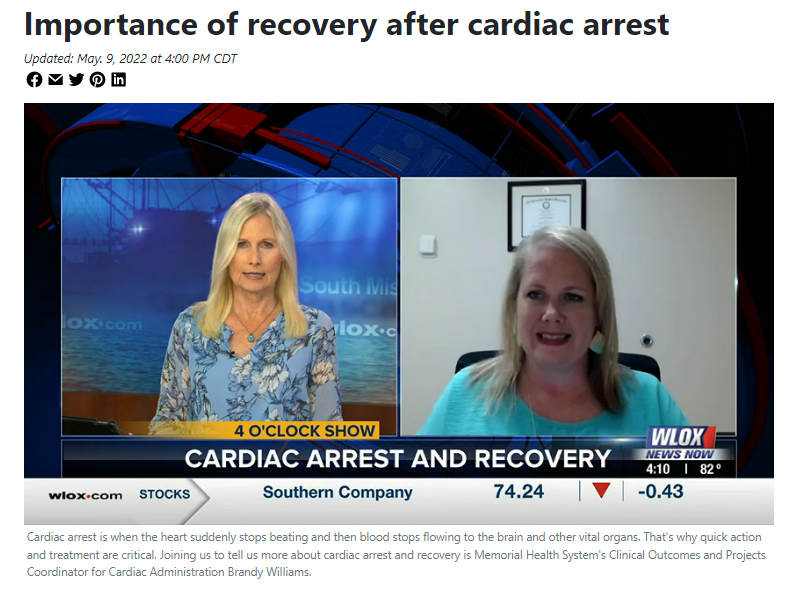Memorial provides exceptional cardiac care
Cardiac arrest can affect anyone. In America, around 1,000 people experience an out-of-hospital cardiac arrest (OHCA) each day, with 90% of those incidents being fatal (source).
Memorial is dedicated to improving outcomes for patients that experience OHCA. Recently, our team was recognized for achieving better outcomes than the state and national averages, according to the Cardiac Arrest Registry to Enhance Survival.
Learn more about cardiac arrest symptoms and why Memorial is the best option for those suffering from cardiac arrest from Cardiac Administration Clinical Outcomes & Projects Coordinator Brandy Williams.
What are the symptoms of cardiac arrest?
Signs of sudden cardiac arrest are immediate and drastic and include:
- Sudden collapse
- No pulse
- No breathing
- Loss of consciousness
Sometimes other signs and symptoms occur before sudden cardiac arrest. These might include:
- Chest discomfort
- Shortness of breath
- Weakness
- Fast-beating, fluttering or pounding heart (palpitations)
Call 911 if you or someone else experiences these symptoms.
How does Memorial assist in caring for cardiac arrest patients?
“Memorial has an experienced team that evaluates the cardiac arrest patient in the emergency department to coordinate the patient’s care. We collaborate with the EMS providers and family/friends to determine the circumstances of the cardiac arrest and continue the supportive resuscitative efforts. Some patients require emergency cardiac catheterization, some awaken and are admitted for a thorough work-up, and others may be candidates for targeted temperature management therapy (TTM). This therapy quickly cools the cardiac arrest patient’s body temperature to 32-36 degrees Celsius with the goal to prevent brain injury and improve chances of survival with a good quality of life.”
How did Memorial achieve a higher percentage of survival in comparison to both the nation and the state?
“Several factors have contributed to Memorial’s success. Our community does a great job of calling 911 to get expert emergency support to the scene and begin resuscitation quickly, and our emergency room and critical care staff are very experienced with the care of cardiac arrest patients. We have been providing cardiac catheterizations since 1985 and providing TTM since 2011.”
How can the community help?
“There are many ways you can help someone who may be suffering from cardiac arrest. The importance of calling 911, using an automated external defibrillator (AED) if available, and starting CPR cannot be overstated. This combination is the best chance of a cardiac arrest patient’s survival.”
Learn more from Brandy’s recent interview:

Memorial’s award-winning care
Memorial is a Joint Commission Certified Primary Stroke Center and was the first certified Primary Stroke Center in the state of Mississippi. Memorial received the American Heart Association/American Stroke Association’s Get with The Guidelines®-Stroke Gold Plus Quality Achievement Award. The award recognizes our commitment to ensuring stroke patients receive the most appropriate treatment according to nationally recognized, research-based guidelines based on the latest scientific evidence.
